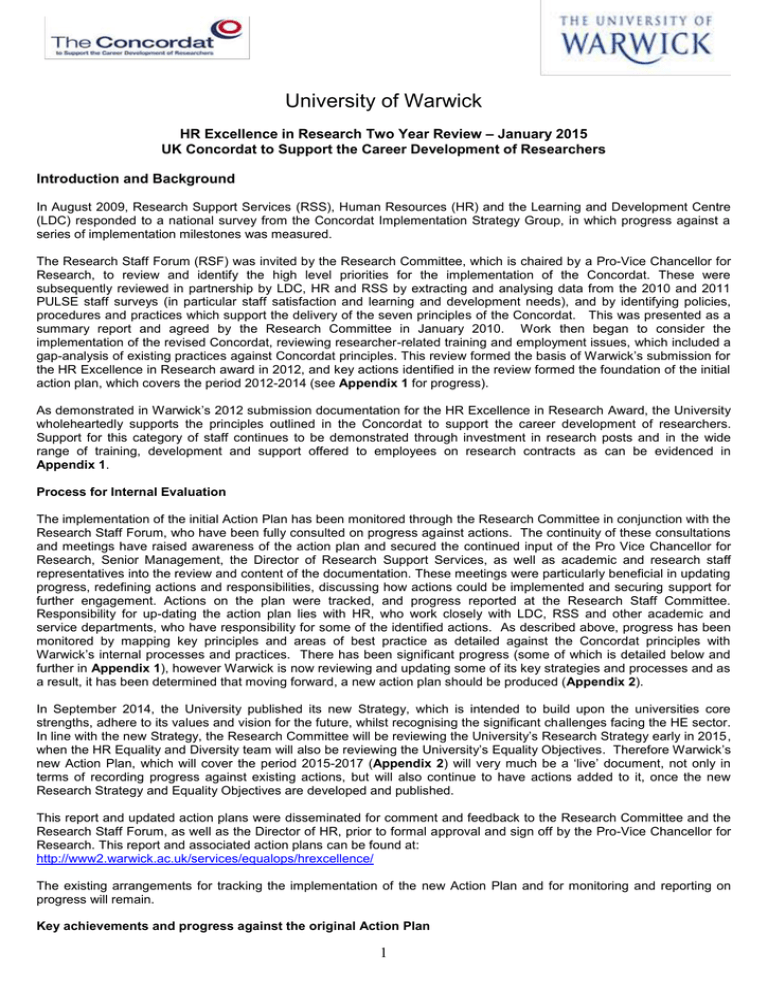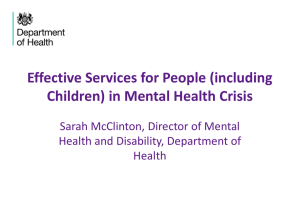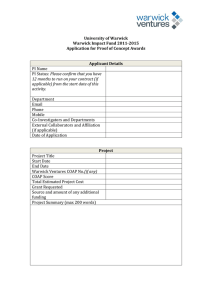University of Warwick
advertisement

University of Warwick HR Excellence in Research Two Year Review – January 2015 UK Concordat to Support the Career Development of Researchers Introduction and Background In August 2009, Research Support Services (RSS), Human Resources (HR) and the Learning and Development Centre (LDC) responded to a national survey from the Concordat Implementation Strategy Group, in which progress against a series of implementation milestones was measured. The Research Staff Forum (RSF) was invited by the Research Committee, which is chaired by a Pro-Vice Chancellor for Research, to review and identify the high level priorities for the implementation of the Concordat. These were subsequently reviewed in partnership by LDC, HR and RSS by extracting and analysing data from the 2010 and 2011 PULSE staff surveys (in particular staff satisfaction and learning and development needs), and by identifying policies, procedures and practices which support the delivery of the seven principles of the Concordat. This was presented as a summary report and agreed by the Research Committee in January 2010. Work then began to consider the implementation of the revised Concordat, reviewing researcher-related training and employment issues, which included a gap-analysis of existing practices against Concordat principles. This review formed the basis of Warwick’s submission for the HR Excellence in Research award in 2012, and key actions identified in the review formed the foundation of the initial action plan, which covers the period 2012-2014 (see Appendix 1 for progress). As demonstrated in Warwick’s 2012 submission documentation for the HR Excellence in Research Award, the University wholeheartedly supports the principles outlined in the Concordat to support the career development of researchers. Support for this category of staff continues to be demonstrated through investment in research posts and in the wide range of training, development and support offered to employees on research contracts as can be evidenced in Appendix 1. Process for Internal Evaluation The implementation of the initial Action Plan has been monitored through the Research Committee in conjunction with the Research Staff Forum, who have been fully consulted on progress against actions. The continuity of these consultations and meetings have raised awareness of the action plan and secured the continued input of the Pro Vice Chancellor for Research, Senior Management, the Director of Research Support Services, as well as academic and research staff representatives into the review and content of the documentation. These meetings were particularly beneficial in updating progress, redefining actions and responsibilities, discussing how actions could be implemented and securing support for further engagement. Actions on the plan were tracked, and progress reported at the Research Staff Committee. Responsibility for up-dating the action plan lies with HR, who work closely with LDC, RSS and other academic and service departments, who have responsibility for some of the identified actions. As described above, progress has been monitored by mapping key principles and areas of best practice as detailed against the Concordat principles with Warwick’s internal processes and practices. There has been significant progress (some of which is detailed below and further in Appendix 1), however Warwick is now reviewing and updating some of its key strategies and processes and as a result, it has been determined that moving forward, a new action plan should be produced (Appendix 2). In September 2014, the University published its new Strategy, which is intended to build upon the universities core strengths, adhere to its values and vision for the future, whilst recognising the significant challenges facing the HE sector. In line with the new Strategy, the Research Committee will be reviewing the University’s Research Strategy early in 2015, when the HR Equality and Diversity team will also be reviewing the University’s Equality Objectives. Therefore Warwick’s new Action Plan, which will cover the period 2015-2017 (Appendix 2) will very much be a ‘live’ document, not only in terms of recording progress against existing actions, but will also continue to have actions added to it, once the new Research Strategy and Equality Objectives are developed and published. This report and updated action plans were disseminated for comment and feedback to the Research Committee and the Research Staff Forum, as well as the Director of HR, prior to formal approval and sign off by the Pro-Vice Chancellor for Research. This report and associated action plans can be found at: http://www2.warwick.ac.uk/services/equalops/hrexcellence/ The existing arrangements for tracking the implementation of the new Action Plan and for monitoring and reporting on progress will remain. Key achievements and progress against the original Action Plan 1 Since the submission and award of the HR Excellence in Research award, the action plan has continuously been updated and completed actions noted. However significant proportions of the plan need to be considered ongoing, which is partly due to the nature of fixed-term employment contracts that postdoctoral research staff are employed on. There is recognition that training and development of researchers at Warwick is essential, not only to equip individuals to progress in their careers, but to ensure that researchers are equipped with critical transferable skills, whether they remain at Warwick or move on to other employment. Warwick has a very proactive Athena SWAN agenda, which replicates many of the actions identified in the Action Plan for the HR Excellence in Research award work, which has assisted in many of the key actions being met. Significant and positive progress has been made on the majority of actions (as demonstrated in Appendix 1), with the remainder partially addressed or due for a complete review. Key achievements (noting that more detail is given in Appendix 1): Warwick was the fourth institution to achieve an Institutional Athena SWAN Silver Award, which demonstrates Warwick’s commitment to implementing fair, transparent and equitable processes and procedures. (Concordat Principles 1, 2 and 6) Warwick is one of only three universities where all of its STEMM departments have achieved Athena recognition, with three of its nine STEMM departments, achieving Silver status. (Concordat Principles 1, 2 and 6) Warwick’s Business School achieved a Bronze award in the Equality Challenge Units Gender Equality Charter Mark trial held in 2013/14. Other departments in the Arts and Social Science Faculties are already working towards future submissions for the Charter Mark. (Concordat Principles 1, 2 and 6) In 2014, a complete review of HR procedures on Recruitment and Selection took place and a number of key projects are consequently being reviewed, developed and will be implemented early in 2015. (Concordat Principles 1 and 6) These all relate to recruitment, such as: Streamlining recruitment and selection forms (removing paper based systems); Tools for shortlisting applications; Justification of why staff are being employed on fixed term contracts; Review of Interview Panel Compositions; A new fit for purpose recruitment website The recognition for and subsequent financial resources to purchase a new HR data system, with more reporting functionality and ‘self-service’ options for staff (currently at tender stage with suppliers). (Concordats Principle 1 and 6) Revised and updated interactive e-learning modules on ‘Recruitment and Selection’ and ‘Diversity in the Workplace’ purchased and launched in February 2014 and all staff encouraged to take the modules, especially those involved with recruitment. Data from the last three years indicates a significant increase in numbers of staff taking the recruitment module: 2012 = 54; 2013 = 140; 2014 – 206 members of staff respectively. (Concordat Principles 1, 5 and 6) LDC have launched new web-based ‘resource bank’, which is a searchable repository of information to support ongoing reference and researcher development. It includes presentations and videos of key workshop talks for example ones on career development, academic writing and statistics. The resource bank had 3,812 hits for the period August 2013 to July 2014 with a further 2,047 hits for the period 1 August 2014 to 31 October 2014. (Concordat Principles 3, 5 and 6) An annual ‘Demystifying the Promotion Process at Warwick’ event for all research active staff, to clarify promotion criteria. In April 2013, 41 members of staff attended and in March 2014, 46 members of staff attended. Of the attendees at the 2013 event, 8 attendees subsequently applied for promotion, and 7 were successful. Of the 46 attendees at the 2014 event, 9 attendees have applied for promotion, the results of which will be known in the Spring Term 2015. The next event is scheduled for 5 March 2015. (Concordat Principles 1, 2, 3, 5 and 6) Research Team Leaders Programme for research managers which ran from 23 January to 7 March 2013 and had 15 attendees. The Programme will run in alternate years. (Concordat Principled 3, 5 and 6) Sponsoring female research active staff on the national Aurora Leadership Programme. 2 female members of staff attended the programme in 2013 and another 2 for 2014. (Concordat Principles 3, 5 and 6) LDC have five thematic areas for the provision of training and development for research active staff. These are: Leadership; Career Development; Research Skills – including academic and bid writing, statistics support Enterprise & Entrepreneurship; Equality and Diversity (Concordat Principles 3 , 5 and 6) 2 Research active staff training and development opportunities, such as: Academic Careers and Employability (which is a programme offering 1-to-1 support); Presenting your Research to Different Audiences; Being an Enterprising Researcher; Technologies for Researchers; Coaching and Mentoring; Research Data Management Support for Researchers. (Concordat Principles 3, 5 and 6) Career progression events, primarily for female researchers, but male researchers are welcome to attend (events on 1 February 2013, 26 September 2013 and 24 September 2014). (Concordat Principles 3, 5 and 6) A Postgraduate Certificate in Transferable Skills in Science for PDRAs has been designed as a career development tool, which gives PDRAs the skills they will need to make the step to an independent career. (Concordat Principles 3, 5 and 6) A monthly electronic Newsletter for all research active staff (circa ~2000). (Concordat Principle 3) All research staff on fixed-term appointments to receive appropriate career development and consultation meetings throughout their employment. (Concordat Principles 3 and 4) Funding opportunities for research active staff networks to support research/academic staff to set up or maintain an existing research active staff network. In 2013/14 £13,000 was used to fund 15 networks and for 2014/15 £6,000 from £13,000 has already been allocated to fund 5 networks. (Concordat Principles 3 and 4) The Global Research Priorities Network (operates across all four faculties). (Concordat Principles 3 and 4) Monitoring of Research Active Staff Promotion Information – See 3.5 on Action Plan in Appendix One for statistics (Concordat Principles 2, 3, 4 and 6) Piirus – a new online research tool developed at Warwick and now being launched globally – See 3.7 on Action Plan in Appendix One. (Concordat Principles 3, 4 and 5) Warwick’s WMG (formerly Warwick Manufacturing Group) has established a ‘Future Leaders Board’, which gives ECRs the opportunity to serve on departmental committees. (Concordat Principles 3, 4, 5 and 6) Improved mentoring facilities, both at institutional and departmental levels – See 4.5 on Action Plan in Appendix One. (Concordat Principles 3 and 5) Whilst significant progress has been made, it is recognised that there is still more work to be done, in particularly to monitor the impact of some of the initiatives in place. Due to some of the actions being in their infancy, it is not yet possible to ascertain their impact, but it is intended to do this both quantitatively and qualitatively in the future. Next steps and focus going forward The remapping of the key principles and areas of best practice in the Concordat with the processes and practices applied at Warwick, has proved to be an effective way of repositioning ourselves and giving us a renewed focus. The review suggests that there are no significant areas of weakness in the way that we support research staff, but we are committed to continued improvement. The new Warwick Strategy gives very clear research ambitions to be achieved within a high performance culture; research staff have an important contribution to make. The Warwick Values of pursuit of excellence, ambition and drive, enterprising, making a difference, community, accessible, global perspective and independence will be applied to the work undertaken. Central to our approach will be engagement of research active staff to assist us with our activities for improvement, but at the same time encouraging them to become champions of their own development and career planning. As can be seen in the new Action Plan (Appendix 2) there are some high profile projects underway, the development of the new Research Strategy will have a major impact on many of the planned initiatives, plus the employment of a new HR Director of Organisational Development, who will be proactively developing talent management processes. Warwick will also be actively seeking to develop mechanisms for the encouragement of, and development in, excellence in research-led teaching and the dissemination of good practice by providing appropriate training and skills based workshops to encourage research staff to participate in research-led teaching activities. The detailed Action Plan (Appendix 2) associated with this review gives our initial thinking on where we wish to focus our efforts, however as previously mentioned some work should be considered on-going, but with the knowledge that more initiatives may be added or re-aligned due to the development of the new Research Strategy which will not be completed until Spring of 2015. Much of the work, especially around recruitment and selection will continue to evolve as the consultations with stakeholders continue and the proposed changes are made and communicated to the wider Warwick community. It is anticipated that the introduction of a new HR system (expected later in 2015) will assist with more concise data collection. 3




